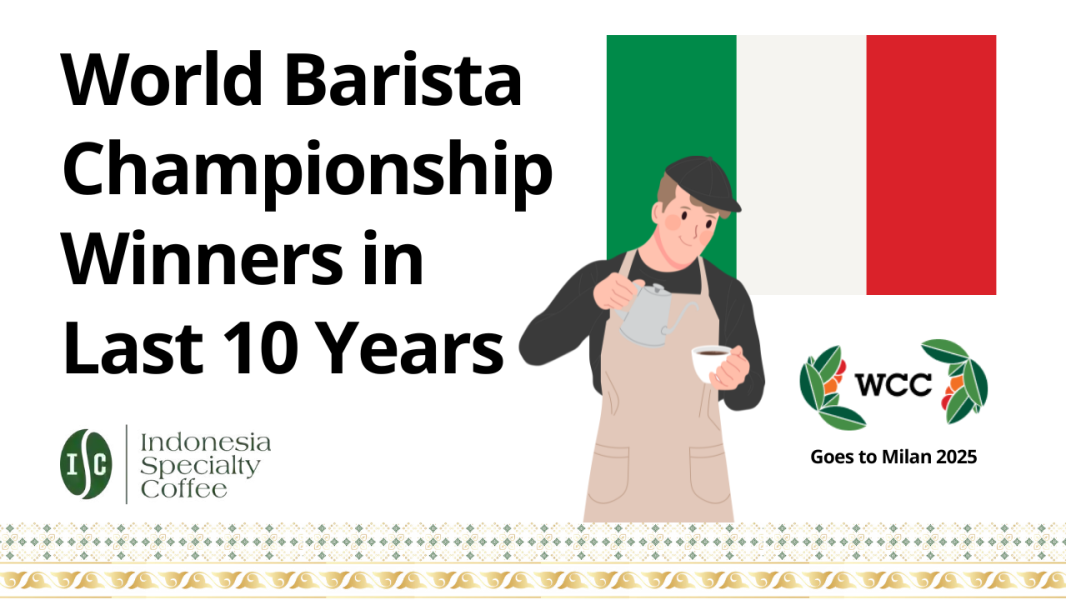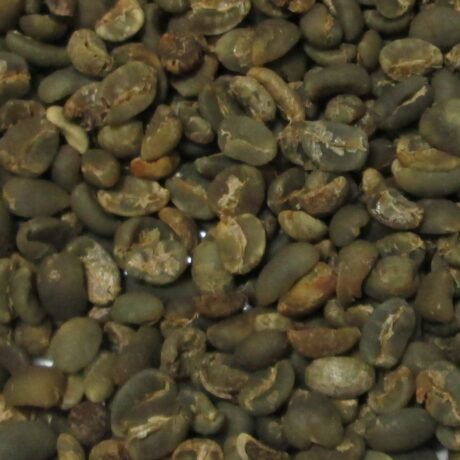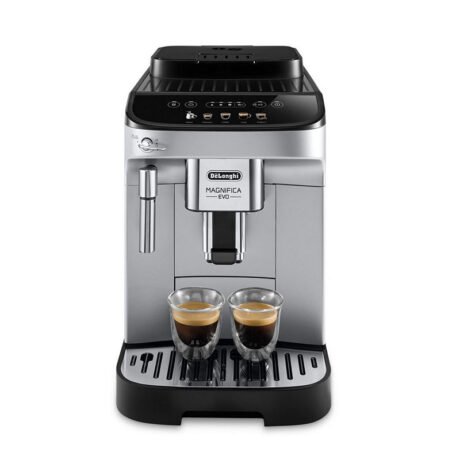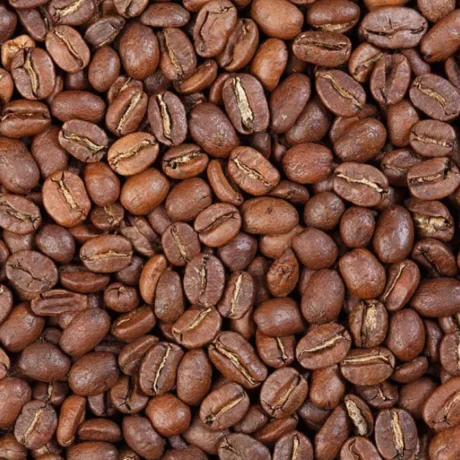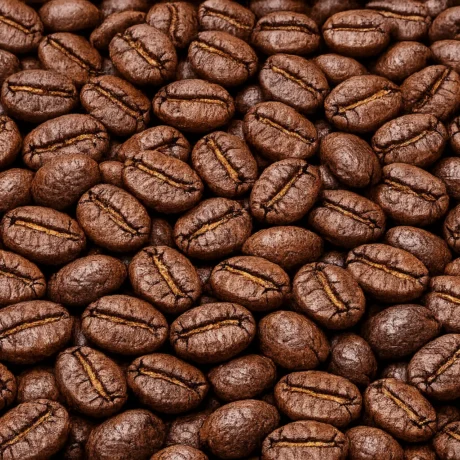Remembering a Decade of World Barista Champions Ahead of WBC 2025 in Milan
The World Barista Championship (WBC) is the most prestigious stage in competitive coffee. Every year, the world’s best baristas step forward to showcase not only their technical skills but also their ability to tell stories through coffee, connecting producers, innovation, and hospitality in a single routine.
In 2025, the WBC will celebrate a special milestone: its 25th anniversary, hosted at HostMilano, Fiera Milano (Rho), in Milan, Italy, from October 17–21, 2025. As part of one of the world’s largest hospitality trade fairs, this year’s WBC is set to be bigger than ever, bringing together the global coffee community in a celebration of passion, creativity, and excellence.
But before we look forward to Milan, it’s worth looking back. The past 10 years of WBC champions (2014–2024) have not only defined the competition but also shaped trends in cafés, roasteries, and consumer preferences worldwide. Each champion brought something unique, from groundbreaking brewing techniques to powerful narratives about coffee producers and the human connections behind every cup.
World Barista Champions of the Past 10 Years
2014 – Hidenori Izaki (Japan)
- Background: Hidenori Izaki made history in 2014 by becoming the first Japanese barista to win the World Barista Championship. He represented Maruyama Coffee, a roastery and café in Nagano that is highly respected for its close relationships with coffee producers around the world.
- Winning Routine / Theme: Izaki’s routine emphasized balance and harmony, both in flavor and in the barista–customer relationship. He carefully structured his presentation to highlight sweetness, body, and acidity, drawing inspiration from both Japanese culture and modern coffee science.
- Why He Won: Judges praised his precision, hospitality-driven approach, and ability to connect sensory experience with storytelling. His espresso and signature drink showcased clarity and complexity, which stood out in the competition.
- Impact: Izaki’s win brought global recognition to Japan’s specialty coffee scene, inspiring a new wave of Asian baristas to pursue competition. His influence is still felt today in Japan’s reputation for meticulous brewing, service, and café culture.
2015 – Sasa Sestic (Australia)
- Background: Originally from Bosnia, Sasa Sestic migrated to Australia and founded Ona Coffee in Canberra. Known as the “Coffee Man,” he has been a driving force in pushing coffee innovation and sustainability, particularly in sourcing and processing.
- Winning Routine / Theme: Sasa’s 2015 routine introduced the world to carbonic maceration (CM) — a fermentation technique adapted from winemaking. He used this method on coffee from El Salvador, showcasing new dimensions of flavor and demonstrating how controlled fermentation could elevate cup profiles.
- Why He Won: His routine was groundbreaking. By bringing CM processing to the WBC stage, Sasa captured the judges’ attention with unique flavor clarity and complexity, while tying his presentation to sustainability and producer collaboration.
- Impact: This win changed the coffee industry. Carbonic maceration became one of the most influential innovations of the last decade, inspiring producers and roasters worldwide to experiment with fermentation. Today, CM and other experimental processes are staples in competitions and high-end cafés — much of it sparked by Sasa’s championship.
2016 – Berg Wu (Taiwan)
- Background: Berg Wu, representing Taiwan, was a barista and café owner who brought attention to his country’s growing influence in specialty coffee. His calm, precise style and deep understanding of extraction science set him apart.
- Winning Routine / Theme: Berg’s presentation highlighted the concept of balance and harmony in espresso extraction. He focused on brewing techniques that maximized sweetness and clarity, using Ethiopian coffee with distinct floral and citrus notes. His routine was elegant, scientific, and deeply customer-oriented.
- Why He Won: Berg impressed the judges with his ability to combine technical mastery with simplicity. Instead of relying on experimental techniques, he showcased how fundamental brewing knowledge, precise control, and genuine hospitality could create a world-class experience.
- Impact: Berg’s victory put Taiwan firmly on the specialty coffee map. His win inspired a surge of interest in both barista competitions and specialty cafés across Asia, further strengthening the region’s role in global coffee culture.
2017 – Dale Harris (United Kingdom)
- Background: Dale Harris, representing the UK, was the Director of Wholesale for Hasbean Coffee. Known for his thoughtful, articulate approach, he combined both coffee science and storytelling in his championship journey.
- Winning Routine / Theme: Dale’s routine revolved around flavor perception and sensory experience. He used Colombian coffee and designed his presentation to guide the judges through how different brewing choices influence the way flavors are experienced. His routine highlighted not just the coffee, but also how we interpret and enjoy it.
- Why He Won: Dale’s ability to educate while engaging the judges stood out. His clarity of communication, structured tasting journey, and focus on perception — rather than only innovation — earned him the title.
- Impact: His win reinforced the idea that barista competitions are not only about new techniques, but also about storytelling, sensory education, and connecting with the consumer’s experience. This helped balance the trend of highly experimental routines by grounding competition in hospitality and communication.
2018 – Agnieszka Rojewska (Poland)
- Background: Agnieszka Rojewska made history in 2018 by becoming the first woman to win the World Barista Championship. A veteran of multiple coffee competitions, she was already well-known in the global barista community for her dedication, skill, and perseverance.
- Winning Routine / Theme: Rojewska’s routine emphasized accessibility and approachability in specialty coffee. She presented with confidence and clarity, using Ethiopian coffee to highlight both complexity and drinkability. Her performance was less about radical innovation and more about showing that excellence can be simple, elegant, and inviting.
- Why She Won: Agnieszka impressed judges with her professionalism, calm demeanor, and ability to create a memorable experience without overcomplicating her presentation. Her routine struck the right balance of technical precision and customer focus.
- Impact: Her victory was groundbreaking. As the first female WBC champion, she inspired a new generation of women in coffee competitions and leadership. Beyond gender representation, her win also reinforced that hospitality and accessibility are just as important as science and innovation on the WBC stage.
2019 – Jooyeon Jeon (South Korea)
- Background: Jooyeon Jeon, representing South Korea, worked with Momos Coffee, a well-regarded roastery and café. She became the second woman ever to win the WBC, and the first from South Korea — a country with one of the world’s fastest-growing specialty coffee cultures.
- Winning Routine / Theme: Her presentation focused on clarity, consistency, and customer experience. Using a Panamanian Gesha, she highlighted elegance in flavor while guiding judges through a smooth, professional service. Her routine was polished, heartfelt, and approachable.
- Why She Won: Jooyeon combined technical mastery with a warm hospitality style, creating an engaging performance that connected emotionally with the judges. Her ability to balance complexity with simplicity made her stand out.
- Impact: Her victory strengthened South Korea’s reputation as a specialty coffee powerhouse and further proved that diversity and representation matter on the world stage. It also highlighted how WBC was shifting toward valuing customer service and holistic hospitality, not just technical innovation.
2020 – Pandemic Pause
WBC events are not held during the Pandemic of COVID-19.
2021 – Diego Campos
- Background: In 2021, Diego Campos made history by becoming the first Colombian barista to win the World Barista Championship, held in Milan, Italy. Representing Amor Perfecto, a specialty coffee roastery in Bogotá, Diego’s victory marked a significant milestone for Colombia, a nation renowned for its coffee production but less recognized for its barista excellence. His win highlighted the growing recognition of Colombian baristas on the global stage.
- Winning Routine / Theme: Diego’s championship performance was deeply rooted in his connection to Colombian coffee culture. He presented a narrative that intertwined his personal journey with the rich history of Colombian coffee, emphasizing the importance of origin stories and sustainable practices. His espresso was crafted from Caturra and Castillo varieties, showcasing the diverse profiles of Colombian coffee. The routine not only highlighted the flavors but also honored the farmers and communities behind the beans.
- Why He Won: Judges were captivated by Diego’s ability to blend technical precision with emotional storytelling. His performance was a seamless fusion of sensory excellence and cultural narrative, which resonated deeply with the audience and judges alike. The clarity of his flavors, combined with his genuine passion for Colombian coffee, set him apart from his competitors.
- Impact: Diego’s victory was a landmark moment for Colombia, signaling a shift in the global coffee community’s appreciation of producer nations not just as suppliers but as leaders in barista excellence.
2022 – Anthony Douglas (Australia)
- Background: Representing Australia, Anthony Douglas worked with Axil Coffee Roasters in Melbourne. Known for its vibrant coffee scene, Melbourne has produced multiple champions, and Anthony carried on that tradition with his thoughtful and modern approach.
- Winning Routine / Theme: His presentation focused on precision and innovation in milk-based drinks. He introduced the technique of frozen distilled milk, which concentrated sweetness and texture while enhancing the overall balance of his beverages. Using a washed Gesha from Colombia, his routine blended cutting-edge technique with refined flavors.
- Why He Won: Anthony’s mastery of both coffee and milk science impressed the judges. His drinks showcased not just technical skill but also creativity that could be applied in real café settings. The combination of innovation, clarity, and accessibility set him apart.
- Impact: His victory cemented the role of milk distillation and milk chemistry in the competition world, sparking widespread adoption in high-end cafés and inspiring further research into how milk influences coffee.
2023 – Boram Um (Brazil)
- Background: Boram Um made history as the first Brazilian barista to win the WBC. Born to Korean immigrant parents in Brazil, he co-founded Um Coffee Co., a specialty roastery and café deeply involved in direct trade with local producers. His win was especially significant because Brazil has traditionally been seen as a producer country rather than a competitor powerhouse.
- Winning Routine / Theme: Boram’s routine celebrated Brazilian coffee at the highest level. He used experimental processed coffees from his family’s farm, showcasing Brazil not only as a volume producer but also as a source of innovation and exceptional quality. His presentation tied together farm, processing, and cup experience.
- Why He Won: Judges praised Boram’s ability to merge producer perspective with barista execution. His performance highlighted traceability, farmer collaboration, and the future of Brazilian specialty coffee, all while delivering technically flawless drinks.
- Impact: His victory shifted global perceptions of Brazilian coffee, proving it can excel on the competition stage. It also highlighted the importance of producers stepping into the spotlight, not just supplying beans but also shaping the narrative of specialty coffee.
2024 – Mikael Jasin (Indonesia)
- Background: Mikael Jasin made history as the first Indonesian barista to win the World Barista Championship, held in Busan, South Korea. He is the founder of So So Good Coffee Company and also part of Common Grounds Coffee Roasters in Jakarta. Mikael had competed multiple times before reaching the top, showing resilience and consistency on the global stage.
- Winning Routine / Theme: His presentation centered on mindfulness and meditation, inviting the judges into a reflective experience while enjoying coffee. For his espresso, he used a Panamanian Gesha from Finca Deborah, celebrated for its floral and complex profile. For milk and signature drinks, he turned to an Ají variety from Colombia, pairing it with a unique milk approach that blended dairy and plant-based options, including local Indonesian cashew milk.
- Why He Won: Judges were impressed by the clarity of flavors across all drinks, his calm yet engaging storytelling, and the innovative use of mixed milks that pushed the boundaries of traditional competition service. His performance struck a balance between technical precision, sensory excellence, and emotional connection.
- Impact: Mikael’s win marked a milestone for Indonesia, one of the world’s largest coffee producers, but long overlooked in global competitions. His victory brought pride to the Indonesian coffee community and signaled that producer nations can also lead in barista excellence, not just green coffee exports. His mindfulness-driven theme also reflected the evolving values of specialty coffee — not only about flavors, but also about the human experience.
Looking Forward to The New Champion
As WBC 2025 approaches, reflecting on the last decade of champions reminds us that coffee is more than just a drink; it’s a story, a craft, and a connection between people across the globe. From technical brilliance to creative storytelling, each winner has pushed the boundaries of what a barista can achieve, inspiring new generations to innovate, experiment, and elevate the specialty coffee scene in their own countries.
The coming WBC in Milan promises to continue this tradition of excellence, showcasing not only extraordinary skill but also the evolving values of coffee culture: sustainability, mindfulness, and emotional connection. While we celebrate the achievements of the past, we also look forward to new ideas, new flavors, and new champions who will define the next chapter of global coffee artistry.
In honoring the last ten years of champions, we are reminded that the World Barista Championship is more than a competition; it is a platform where passion meets precision, creativity meets community, and the story of coffee continues to unfold, one cup at a time.

